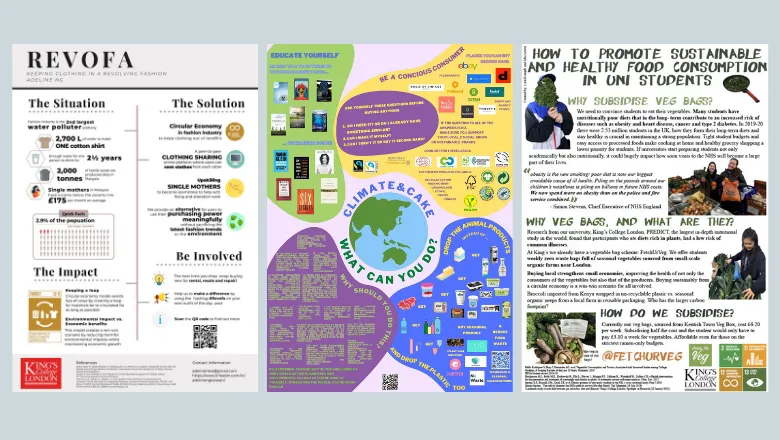The research presented at the London Student Sustainability Conference 2021 highlights sustainability in all its diversity and complexity, and it is inspiring to see so many students developing innovative solutions for these difficult challenges. I am really excited about what we can achieve by working together to solve these global problems, especially through the combined energy and passion of our brilliant students.
Professor Bronwyn Parry, Interim Vice President & Vice Principal, Service
26 February 2021
King's co-hosts the London Student Sustainability Conference 2021
Students from across London presented their ideas for a more sustainable future.

Over 300 people from around the world came together for the virtual London Student Sustainability Conference 2021 (LSSC) on Wednesday 24th February. This student-led event, highlighted research and projects that aim to make the world a fairer and more sustainable place, with presentations, posters and performances by 53 students from a number of London universities.
For the first time, King’s co-hosted LSSC with City, University of London, demonstrating our shared commitment to embedding sustainability into our education, research, leadership, operations and engagement activities.
Professor Bronwyn Parry, Interim Vice President & Vice Principal for Service, delivered the conference’s opening address, outlining King’s mission to champion sustainability in all its forms – be that environmental, social or economic – and the sense of hope that the energy and passion of students gives her for the future.
Geography student, Yik Kei Leung, played a leading role in organising LSSC and also welcomed attendees to the conference, commenting on the importance of collaboration and inclusivity in sustainability.
Sustainability is all about inclusivity and the LSSC embodies this as a collaborative effort from both City and King’s to provide an opportunity for students, across London and beyond, to share their own work and learn from other passionate students.
Yik Kei Leung, BA Geography
Each of the 12 LSSC sessions were mapped against the United Nation’s Sustainable Development Goals (SDGs). These 17 goals cover a range of environmental and social sustainability issues and are designed to achieve a fair and just society for all by 2030. From sustainable construction to eco-feminist approaches to climate change, a diverse range of complex challenges were discussed at the conference, with innovative solutions proposed by students.
King’s was well represented at LSSSC with 20 students from across the university presenting on a wide range of projects.* Talks by King’s students included how COVID-19 could help explain the gap between environmental concern and behaviour, how solar energy can advance environmental sustainability and social reform within Lagos, and the role AI-assisted personalised education could play in creating a sustainable future.
I am so inspired by all the students clearly demonstrating that 'sustainability' is not just a nice add-on or buzzword. It concerns how we live every day and the SDGs remind us that we all can and should participate in shaping the world around us for the better.
Natasha Ibori, MSc Emerging Economies & International Development
King’s students also won three of the four LSSC poster competition prizes, with Environment and Development Master’s student Adeline Ng winning both the ‘Attendees Choice’ and the ‘Most Effective Visuals’ for Revofa, a digital platform that aims to create a circular economy in the fashion industry. While King’s students Liza Konash (BSc Nutrition) and Mia Lewis (BA International Relations) were awarded ‘Best Overall Poster’ for Fetch Ur Veg, a vegetable bag scheme which provides students with weekly zero waste bags full of seasonal vegetables sourced from small-scale organic farms near London.
The London Student Sustainability Conference was a fitting end to King’s Sustainability Month, an annual event which brings students and staff together to collaborate, share knowledge, and equip the King’s community with the tools they need to help build a more progressive and positive future together, both at King’s and beyond.
At King’s, we recognise that students are integral to advancing the Sustainable Development Goals (SDGs) and the sustainability of our education sector. We were therefore delighted to co-host the London Student Sustainability Conference with City University this year. This student-led conference, which is mapped against the SDGs, demonstrated the transformational role our students play in helping to build a sustainable and inclusive future we can be proud of, and the cross-collaboration within the sector which is needed to get there.
Kat Thorne, Director of Sustainability, King’s College London
King’s is committed to championing and embedding sustainability into our research, our education, and our operational practices right across the university. An example of this commitment in action is the newly formed Climate Action Network, which is bringing staff and students together to help shape King’s net-zero carbon strategy by 2025.
King’s also aims to fulfil our commitment to positive and transformational social impact by delivering on the United Nation’s SDGs. Our success in delivering on this commitment is demonstrated through our position in the most recent Times Higher Education (THE) Impact Rankings, which uses the SDGs as a framework for measuring the broader social impact of universities. King’s was very proud to place ninth in the world, and second in the UK, in the 2020 THE Impact Rankings, recognising the positive social, environmental and economic contributions we are making within our local, national and international communities.
*Projects by King’s students presented at LSSC 2021
- ‘How to Promote Sustainable and Healthy Food Consumption in University Students’ (Liza Konash, Mia Lewis)
- ‘Proposing the Implementation of Hydrogen Fuel Cells with CHP at King’s College London’ (Jone De Roode Jauregui, Robyn Lees, Yik Kei Leung, Phoebe Phillips)
- ‘Investigating Contextual Patho-aetiologies of Adverse Maternal Outcomes as Modified by Air Pollution Across Contrasting Sub-Saharan African geographies: Evidence from Mozambique, Kenya, and the Gambia’ (Liberty Makacha)
- ‘Lighting Up Lagos Markets with Clean Energy’ (Natasha Ibori)
- ‘Awareness of Carbon Emissions on the King’s Estate’ (Natasha Alexander, Sarah Buckwell, Sarah Dillon, Wai Yin Fung, Max Kindred, Muhammed Munaim)
- ‘Exploring the influence of green roofs on particulate matter pollution in central London’ (Priyam Grewal)
- ‘How Covid-19 Could Help Explain the Gap Between Environmental Concern and Behaviour’ (Jone de Roode Jauregi)
- ‘Revofa’ (Adeline Ng)
- ‘The Role of Saharan Dust as a Fertiliser to the Amazon Rainforest’ (Robyn Lees)
- ‘Climate and Cake’ (Ana Oancea)
- ‘AI-assisted Personalized Education for a Sustainable Future’ (Abhiram Ravikumar, Misha Zahid)

